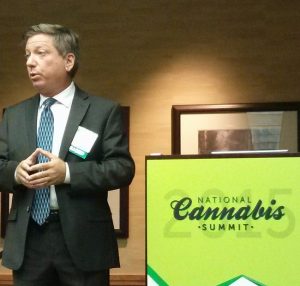After years of frustrations and legal struggles, there appears to be light on the horizon for Colorado’s embattled Fourth Corner Credit Union, the first financial institution created specifically to serve the legal cannabis industry.
Late Monday the Wall Street Journalreported that the Federal Reserve Bank of Kansas City had granted conditional approval for Fourth Corner to serve cannabis-related businesses. However, according to the newspaper, the firm will not serve state-licensed marijuana dispensaries as originally planned, but will instead “focus on individuals and companies that support legalized marijuana.”
With cannabis categorized as a Schedule I drug and illegal under federal law, most financial institutions have refused to work with state-legal cannabis businesses. They’ve also refused basic banking transactions such as opening business accounts out to fear of potential federal prosecution. That has forced many licensed, state-legal cannabis companies to work as cash-only operations, which creates concerns about crime and public safety.
Four Years To Get This Far
So when Fourth Corner Credit Union was launched in late 2014 and was chartered by Colorado state officials, its establishment was seen as a critical issue.
Mark Goldfogel: ‘Glad to move forward.’
But the Kansas City Federal Reserve Bank, which has jurisdiction over Colorado, refused to approve the credit union’s master account. That’s the mechanism that lets financial institutions interact with each other. Fourth Corner was also denied deposit insurance by the National Credit Union Association (NCUA).
In July 2015, Fourth Corner filed a lawsuit against the Kansas City Federal Reserve Bank in federal court, stating that without access to a master account “a depository institution is nothing more than a vault.”
But in early 2016 a U.S. District Judge shot down Fourth Corner’s lawsuit, saying he could not use the court’s power “to issue an order that would facilitate criminal activity.”
Fourth Corner successfully appealed that decision last year, which led to the credit union filing yet another lawsuit in federal court – which leads us up to the Kansas City Fed’s latest action.
Next Step: Deposit Insurance
“I’m grateful that we’ve reached a settlement,” Fourth Corner Executive Vice President Mark Goldfogel told Leafly late yesterday. “I’m glad that we can move the ball forward for the industry. And with every decision like this, the industry gets closer to regulated banking.”
Closer perhaps, but not yet there. Goldfogel said the decision doesn’t mean the credit union can finally start its operations.
“What it means is that the weak link for our operating is no longer a master account,” he said. “The biggest weak link right now is getting share deposit insurance, preferably from the NCUA.”
If the NCUA refuses, Goldfogel said Fourth Corner could turn to “a private institution interested in solving the problem.”
Ancillary Companies Only
According to the terms of the Kansas City Fed’s approval, Goldfogel said Fourth Corner “cannot service plant-touching businesses.”
But the ability to provide credit union services to ancillary cannabis businesses, he said, represents a significant breakthrough. The regional Fed’s decision, he added, “validates the importance of the cannabis legalization movement, and the movement’s right to coalesce funds to solve this problem.”
And what might have prompted the Kansas City Federal Reserve Bank to conditionally grant the credit union a master account?
Goldfogel believes that officials at the institution finally understood that Fourth Corner’s mission is to support legal cannabis businesses, “and not that this was some sort of sleight-of-hand, to try and work what could be considered money laundering funds into the banking system.”
He added that the current political landscape might actually be helping cannabis legalization.
“I’m actually more optimistic about something happening in light of [Attorney General Jeff] Sessions’ rescinding the [Cole Memo] than I was before,” he said. “Because the rescinding of the memo pushes the obligation of Congress to solve the problem correctly, at the very least, for banking.”





